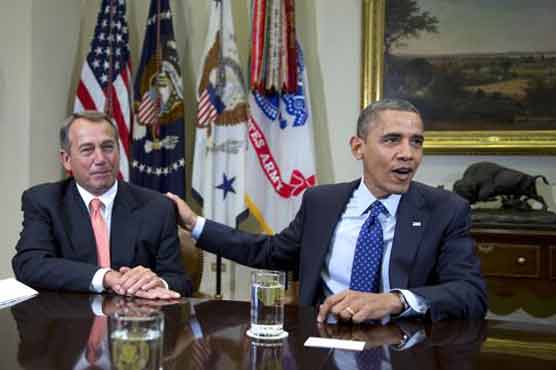Movement seen in 'fiscal cliff' talks

Obama has offered $600 billion in spending cuts over a decade.
WASHINGTON: There has finally been some movement in long-stalled talks on avoiding the "fiscal cliff," as the top Republican in Congress has offered to bend on raising taxes on some wealthy earners though not as many as President Barack Obama wants, and only in exchange for cuts to popular benefit programs cherished by Democrats.
But as details emerged of the first offer by House of Representatives Speaker John Boehner to increase tax rates, some optimism bloomed in Washington just as time is running out before Congress adjourns. Tax rates on all workers go up when Bush-era cuts expire in January, and $109 billion worth of automatic across-the-board spending cuts begin to take effect then as well.
Taken together with the expiration of extended jobless benefits and a 2-percentage-point break in Social Security pension taxes, the combination of austerity steps threatens to send the economy back into recession.
Under that cloud, a long impasse between Boehner and Obama ended Friday when the speaker offered $1 trillion in higher tax revenue over 10 years and an increase in the top tax rate on people making more than $1 million a year. He's also offering a large enough extension in the federal government's borrowing cap to fund it for one year before the issue must be revisited conditioned on Obama agreeing to the $1 trillion in spending cuts.
The movement comes as an increasing number of Republicans have called for a tactical retreat that would hand Obama a victory on his longstanding campaign promise to raise taxes on households making more than $250,000 a year in order to rein in deficit spending without hurting the middle class. That increase, combined with an increase in the tax rate on investment income from 15 percent to 20 percent, would raise about $800 billion in tax revenue over a decade.
Boehner's offer calls for about $450 billion in revenue from increasing the top rate on million-dollar-plus income from 35 percent to the Clinton-era rate of 39.6 percent. The additional revenue required to meet Boehner's $1 trillion target would be collected through a rewrite of the tax code next year and by slowing the inflation adjustments made to tax brackets.
In return, Boehner is asking for $1 trillion in spending cuts from government benefit programs like Medicare, the federal health care program for the elderly. Those cuts would defer most of a painful set of across-the-board spending cuts set to slash many domestic programs and the defense budget by 8-9 percent, starting in January.
Boehner's proposal was described Sunday by officials familiar with it. They required anonymity because of the sensitivity of the talks.
Boehner also continues to press for a less generous inflation adjustment for Social Security pension benefits, a move endorsed by many budget hawks. Obama and Democrats on a deficit "supercommittee" endorsed the idea in offers made last year, but they're more reluctant now.
The burst of optimism is tempered by the caution that the remaining steps to reaching a deal particularly how much to cut Medicare and whether to impose the new, less generous inflation adjustment to Social Security pensions are difficult. Then comes the job of selling it to a polarized Congress, where Republican conservatives have been railing against higher tax rates for months as a sure way to kill jobs and hurt small business, and Democrats have taken a harder line against cost cuts to Medicare.
But it appears clear there is momentum as White House and congressional aides worked through the weekend.
"Apparently they have been making good progress since Boehner made (the offer)," said a Democratic congressional aide.
Boehner's move could be seen as an attempt to get spending cuts linked to the tax rate increase, rather than giving them up and getting nothing in return. Judging from the numbers, Boehner also seems willing to allow tax rates on investment income to increase for high-end income and reduce tax exemptions and deductions for high-income earners.
Still, the Boehner offer is sure to cause unrest among many conservative Republicans dead set against raising tax rates at all.
Obama has offered $600 billion in spending cuts over a decade, including $350 billion from federal health care programs and $250 billion from other cuts to domestic programs like farm subsidies and the pension program for federal workers, and through sales of used federal property.
Obama and Boehner met Thursday in a session described as "frank" by both sides. Boehner's offer and a follow-up phone call came the next day, amid increasing speculation that Republicans might move on to a plan B in which they would give Obama a win on tax rates for upper-bracket earners and renew the fight when increasing the government's borrowing cap which needs to be done soon, probably in February.


